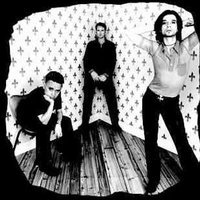Andy Fletcher wasn’t thinking long-term when he and the other founding members of Depeche Mode cut the sugarcoated synthpop classic “Just Can’t Get Enough” in 1981. But here they are — not only still together but still headlining arenas in support of a vital new album called “Delta Machine,” their approach still surprisingly relevant.
“To be honest,” Fletcher says, “in the beginning, we thought we’d only last a couple years. And obviously, we’ve gone through ups and downs. There is a bit of luck involved, but we’ve got a great songwriter (Martin Gore), a great front man (Dave Gahan) and we’ve got a great sound. So all those elements have sort of come together.
“And we’ve worked very hard as well. We’ve stuck together. We’re very lucky. We come from the same town. We’ve got the same backgrounds. And we really appreciate the career that we’ve had. It’s sort of a dream come true for us, really, 30 years on, to still be successful.”
“Delta Machine,” the U.K. rockers’ 13th studio release, debuted at No. 6 here in the States and sent a soulful electronic ballad, “Heaven,” to the top of Billboard’s dance charts.
Mathew Blades, an on-air personality at Mix 96.9, says it made perfect sense to hear a remix of an old Depeche Mode record pop up in a recent iTunes podcast by Tiesto, a hip electronic producer who topped a list last year in Rolling Stone of 25 DJs That Rule the Earth.
“They’ve somehow kept the coolness factor,” Blades says. “And I think the reason that they are so relevant today is maybe because they were so far ahead of the curve when they first came out. So the music world, in a lot of ways, had a lot of catching up to do with Depeche Mode. All this cookie-cutter pop that comes out now, it’s like you’ve gotta make a song that has the sound that radio wants to play right now. And that was not the case with Depeche Mode.”
Conventional beginnings
Although Depeche Mode’s first wave of success was clearly driven by the early ’80s synthpop boom, there were no synthesizers present when Fletcher and founding member Vince Clarke started playing together.
“Originally, we were a conventional band with bass and guitar,” Fletcher says. “We had a drum machine. We didn’t have a drummer. But luckily, at that time, these monophonic synthesizers came onto the market. They were very cheap, about $150. We were listening to Kraftwerk and early Human League and Orchestral Manoeuvres in the Dark and stuff like that. And Vince sort of made a decision that we should go all electronic.”
With a laugh, Fletcher says, “I had never played a keyboard in my life. So it was quite a challenge at first. But that’s how we settled on it, really. And by then, we’d recruited Martin and Dave. I mean, to be honest, and I think all groups say this, we didn’t really intend to be successful. It was just really a hobby.”
Depeche Mode proved an overnight sensation in the U.K., with a string of early chart successes. But the inroads they made in the U.S. came in the form of dance hits — “Just Can’t Get Enough” and, two years later, “Get the Balance Right!” and “Everything Counts” — until “People are People,” their first Top 40 entry on the Hot 100, hit the streets in 1984.
Asked how he felt about seeing Depeche Mode positioned as part of the synthpop movement at the time, Fletcher brushes it off.
“We were young,” he says. “It’s like the Beatles in the early years. They were pop, weren’t they? Sort of bubblegummy almost. And we were lucky that we had people like Daniel Miller around us at our record company, and we were allowed to mature as a band, to come out of that pop time and to grow our music. It’s nice, though, that we had the pop beginning.”
Fletcher thinks those early synthpop hits are “really good,” he says. “Some of them are a bit embarrassing. Some of the videos are definitely embarrassing. But it’s all part of growing up.”
Bold new sound
The synthpop moment had already lost its luster by the time they scored their next Top 40 single in the U.S. with the 1989 release of a steamy electro-blues triumph called “Personal Jesus.” The first of three Top 40 hits from the triple-platinum “Violator” album, it ushered in a bold new sound a world removed from “Just Can’t Get Enough.”
“I think ‘Personal Jesus,’ today, stands alone as one of the best songs of all time,” says Blades, who like a lot of U.S. listeners, started paying more attention to Depeche Mode with the “Violator” album.
And that record’s blend of blues and electronic music also laid the template for “Delta Machine,” albeit unintentionally.
“We wanted to produce something that’s relevant and lasting,” he says. “And we had a direction really early on, which was electronic with sort of a bluesy feel.”
They even named the album with that sound in mind.
“For once,” Fletcher says with a laugh, “we’ve got an album title that describes the music.”
It wasn’t until they were finished, he says, that it occurred to him that “Violator” blended blues and electronic sounds.
“After making the album,” he says, “you look back and you see, oh, we’ve done that before. It’s not just something made up from nowhere. We have done that sort of direction.”
Fletcher still sees “Violator” as Depeche Mode’s peak, saying he thinks it’s “as perfect an album as you can make.”
Beef Vegan is music director and host of the popular morning show TMI on KWSS-FM (93.9), a local alternative radio station that still plays Depeche Mode as often as three times a day. And he says he hears echoes of Depeche Mode in contemporary music all the time.
“There was just something about them that seemed to be more original as they embraced the synth as their key sound and then built everything up around it, as opposed to being led by guitars and having a little bit of synth,” he says. “You hear a song and you know it’s Depeche Mode.
“And today, there’s a lot of keyboard sounds that they first started breaking ground with over 30 years ago that kids are still doing, emulating, even copying chords. We play a lot of synth-driven music on TMI. It seems like Depeche Mode would have fit in well with the bands that are breaking on the indie scene right now.”
And the fact that they don’t care if what they’re doing fits in well with what the kids are doing now may be the key to their enduring impact.
“We don’t really look around us,” Fletcher says. “We just seem to proceed by ourselves.”




